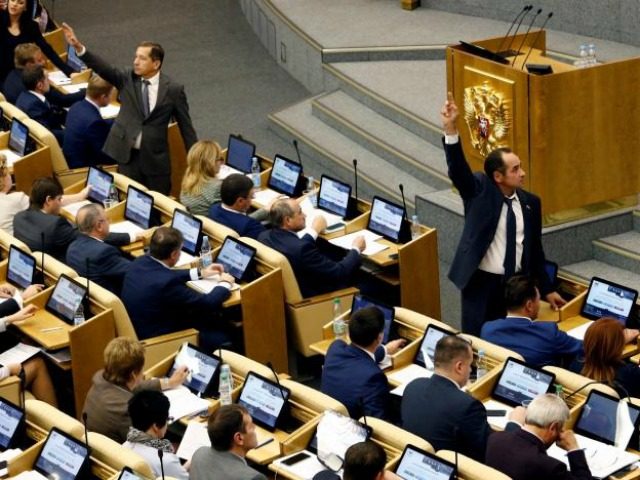On Wednesday, the Russian Parliament’s lower house voted to approve President Vladimir Putin’s decree suspending a plutonium disposal agreement with the United States.
Reuters reports Putin’s decree was supported by 445 of 450 deputies in the State Duma.
Putin ordered the suspension of the 2000 accord due to “the emerging threat to strategic stability as a result of U.S. unfriendly actions” and also because the Unites States ostensibly failed to hold up its end of the deal, reports the New York Times.
The Times notes a flurry of carrots and sticks pouring from the Kremlin:
Putin said the deal could be restored if the U.S. pulls back forces deployed near Russia’s borders and revokes anti-Russian sanctions.
Deputy Foreign Minister Sergei Ryabkov told lawmakers Wednesday that Moscow could take other steps that would hurt the U.S. if Washington ratchets up sanctions.
“If the U.S. moves to expand sanctions, we will take measures that would be quite painful to the U.S. positions in the world,” he said without elaboration.
Foreign Policy sees the plutonium fight as part of Putin’s “nuclear saber-rattling and military brinksmanship” and a sea change from decades of Washington and Moscow carefully keeping nuclear affairs separate from all other disputes:
President Barack Obama’s successor will have to choose from a range of unpleasant and risky options when it comes to handling a resurgent Russia, current and former officials said. A more conciliatory stance, aimed at cutting a grand bargain with Russia focused on Ukraine, would defuse tensions in the short term but at the cost of ultimately emboldening Putin. A more hawkish line — like the one championed by Clinton, who is leading nationwide polls — would risk escalation, with the chance of a military showdown in Syria or the Baltics.
Following the failure of the Obama administration’s bid to “reset” policy with the Kremlin and capped by Putin’s return to the presidency in 2012, Russia has increasingly insisted on linking disparate issues, refusing to cooperate even on areas of common interest in order to pressure Washington on other disputes. That’s the opposite of how things worked in the era of superpower detente in the 1970s, when both countries obeyed clear boundaries and unwritten rules. Decisions on nuclear weapons, in particular, were kept apart from other issues and disputes around the globe.
The Russians have also been complaining about U.S. anti-missile technology for years, portraying missile shields not as defensive measures, but as offensive, destabilizing weapons that could allow shielded nations to launch first strikes with impunity. Alarmingly, even more menacing governments than Moscow have picked up on that rhetoric.

COMMENTS
Please let us know if you're having issues with commenting.